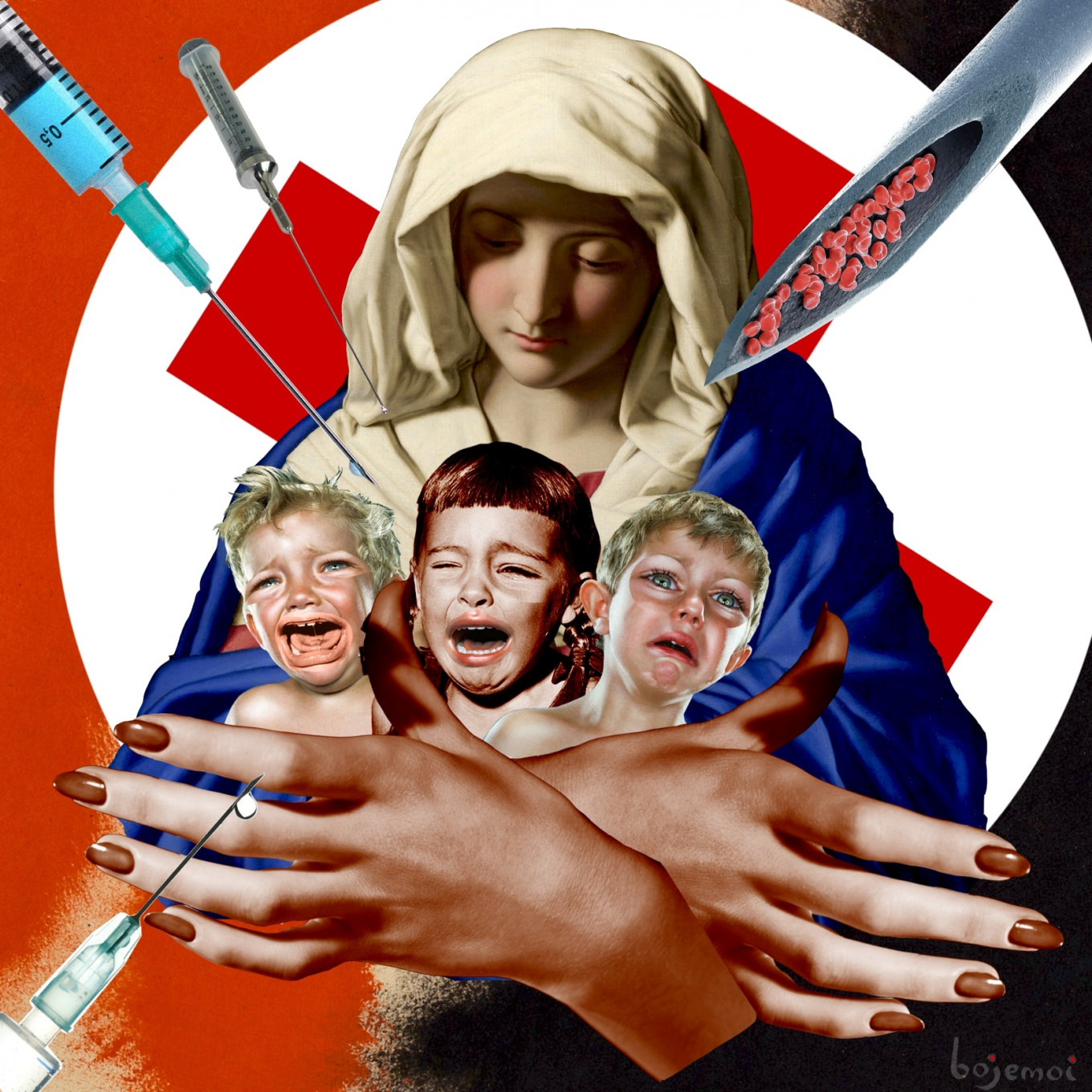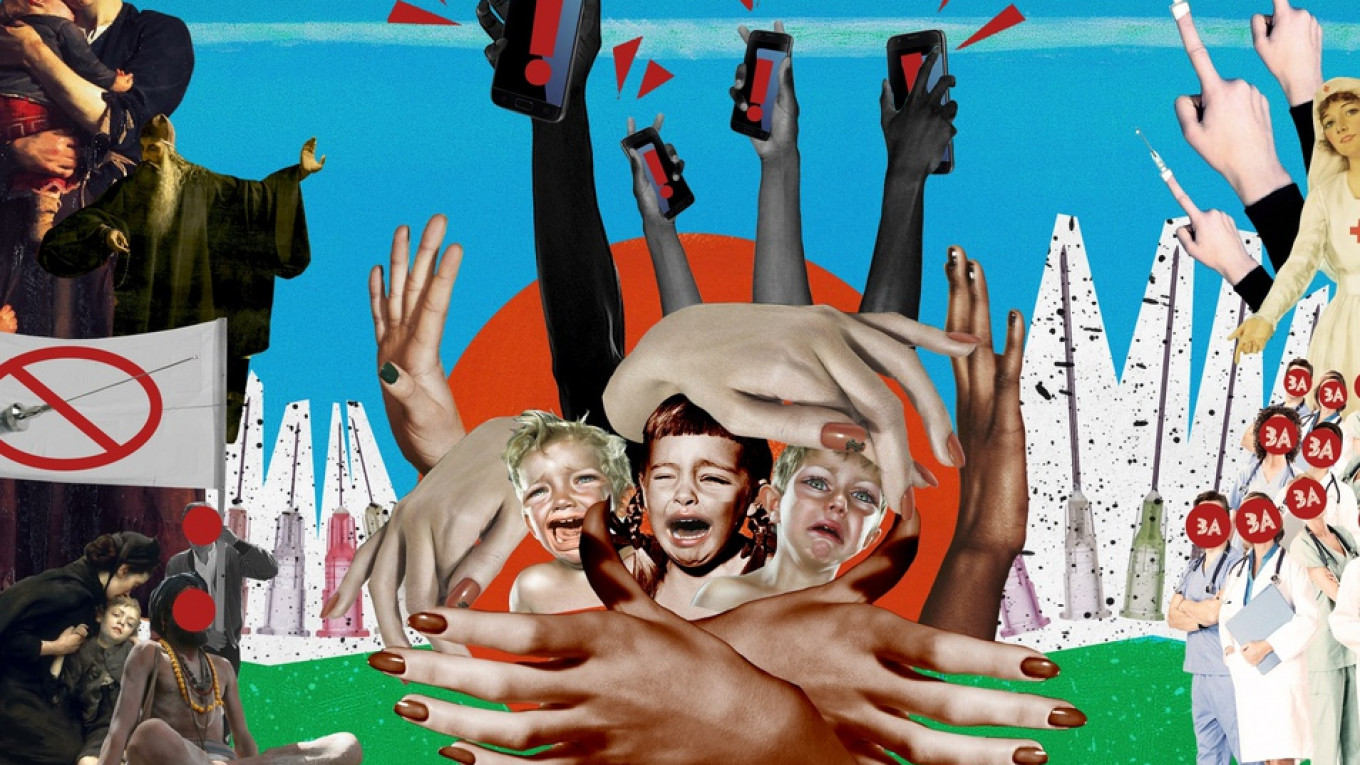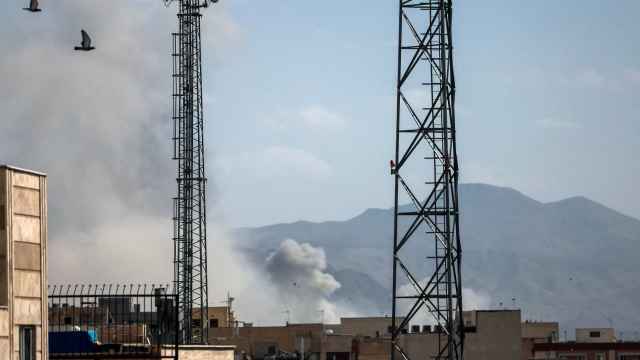The problems began only after Anastasia Dvoretskaya’s son turned one.
Before, she says, he had been a healthy child. Then, during his second year, he came down with a nagging cough, then recurring throat infections, and then the flu.
Up until that point, Dvoretskaya, 30, had vaccinated her son on schedule. But after talking to other parents and researching online, the architect, who lives just outside of Moscow, decided to stop.
“Now he’s back to being a healthy kid,” Dvoretskaya said. “And my younger son” — who has never been vaccinated — “has never really been sick.
Like in most Russian families, Dvoretskaya, as the mother, makes the decisions when it comes to her children. And like a surprisingly large contingent of Russian mothers, Dvoretskaya doubts that vaccines are necessary.
In 2017, the Federal Center of Hygiene and Epidemiology reportedly determined that 48.7 percent of Russian children born in 2016 had not been vaccinated comprehensively and on the medically prescribed schedule.
As a result, Russian medical experts say the country struggles to maintain so-called herd immunity — the threshold percentage of the population that must be immunized for a disease to be kept at bay, generally considered to be between 92 and 95 percent — for diseases like diphtheria and measles, among others.
The latter, for instance, is making a resurgence: So far this year, Russia has seen a 13-fold increase, following a trend in Europe and in the United States. In August, the World Health Organization singled out Russia alongside six other European countries for having more than 1,000 cases.
This state of affairs has the Kremlin’s attention. In March, President Vladimir Putin said on national television he was considering taking measures because “it has become trendy not to vaccinate your kids.”
In the West, the return of diseases like the measles have been attributed to recent populist movements, which have eroded trust in authority, and, most recently, Russian trolls, which have spread misinformation in service of dividing electorates.

But back home in Russia, a deeper-rooted distrust in authority has resulted in the phenomenon of parents choosing to not vaccinate their kids almost as an expression of agency.
“This doubt in any authority has been building up over many generations in Russians,” says Sergei Butry, a pediatrician. “If our government has been controlling people for many decades, here is one sphere of life where a person can stand in opposition.
“The anti-vaccine sentiment is in the air in Russia and it is very easy to catch,” Butry added.
Newfound agency
Up until two decades ago, medical experts say that Russians did not decline vaccines en masse like today.
While parents could decide to not vaccinate their children during the Soviet period, there was a different mentality back then, says Alexei Rtishchev, who specializes in infectious diseases among children at the Russian National Research Medical University.
“The Soviet way was: If a doctor told you to do something, you did it,” he said.
But that began to change after the fall of the Soviet Union. As Russia moved to democracy in the early 90s, Russians started to become conscious of their rights, says Sergei Kolesnikov, who studies Russia’s healthcare system at the Russian Academy of Sciences.
And in 1998, legislation was passed that required parents’ consent before any medical procedure — including vaccinations — is done. The new law, medical experts say, planted the idea in Russians’ minds that they could decide not to vaccinate their children.
“This is the tragedy of democratization,” says Kolesnikov. “If, before, a doctor would say, ‘Yes, this needs to happen,’ now a parent will say, ‘Well, we don’t want this and we’ll take you to court if it happens.’ Does a doctor want to sit behind bars?”
Declining vaccines is also particularly easy in Russia. In the United States, for example, parents must obtain religious exemptions, but in Russia, “all a parent has to do is say they don’t want the vaccine,” says Rtishchev.
For Dvoretskaya, the decision to not vaccinate her children was ultimately about personal choice.
“I subscribe to a healthy lifestyle, which is all tied to being conscious about your life choices,” she said. “You need to figure out why people do certain things and not simply do them because you’re told, and then make your own decision.”
That desire to take individual control of one’s personal lifestyle choices is one that has trended upward in Russia in recent years. Movements like yoga, vegetarianism and veganism have taken hold in Moscow and St. Petersburg. For those who continue to eat meat, supermarkets and restaurants now feature less fatty options like turkey.
In a country with low life expectancies and high smoking and drinking rates, the wellness movement, in many ways, is a positive, says Daria Sarkisyan, health editor at the independent Meduza news outlet.
But there’s also a darker side to it, Sarkisyan notes, with people turning to osteopathy and homeopathy — which she describes as “synonymous with anti-vaxxing” — over traditional medicine, shirking anything they see as unnatural.
“There’s a lot of misinformation out there,” Sarkisyan says. “And those that speak out against vaccines are the loudest.”
Cosmopolitan anti-vaxxers
Type “vaccines are” in Russian into Google and the search engine will autofill: “evil,” “poison,” “a business,” “genocide” and “painful.”
On social networks like Facebook and VKontakte, groups that speak out against vaccines abound. “The truth about vaccines” — one of the most prominent VKontakte groups, which carries the tagline “There are no safe vaccines!” — has nearly 92,000 members.
On Facebook, one prominent group, “1796 - homeopathy and vaccines,” is run by Russia’s leading homeopath and one of its most outspoken anti-vaxxers, Alexander Kotok. (Kotok declined to comment for this story, citing a personal rule of “not working with the media.”)
His writings were a big part of what influenced Maria Romanova, the managing editor of the Russian Yoga Journal magazine, and a former beauty and health editor with the Harper’s Bazaar Russia edition, in choosing to not vaccinate her son. Her belief that pharmaceutical companies are just big business selling the public on vaccines combined with her doubts about Russia’s medical system, led Romanova to decide that vaccines weren’t necessary.
“In Russia, there is a tendency to look at people who choose to not vaccinate their children as trying to take a stand against authority,” she says. “But at the end of the day, it’s a health issue.”
Tatiana Ivanova, 36, a manager in publishing, stopped vaccinating her son when he was three. “He had chronic bronchitis and ear infections,” she says. “And at some point, I started talking to my friends and reading about homeopathy.”
After meeting one homeopathic practitioner in person, who suggested that Ivanova stop vaccinating her son, Ivanova followed her advice, and hasn’t immunized her second child either.
“The important thing for me was that she had a 15-year background in traditional medicine before turning to homeopathy,” says Ivanova. “As a person with standard education, this was really important for me.”
“Homeopathy opened my eyes,” Ivanova added. “Before talking to her, I didn’t even realize you could avoid vaccines. My mother gave me all my shots and never thought to question them.”
Yelena Manchinskaya, the general director of a Moscow-based IT-company, says she is “astounded” by the number of people in her social circle that don’t vaccinate their children. “It’s very common among my acquaintances and mothers at my daughter’s school,” she says. “And these are upper middle-class, educated people.”
One recent experience, she says, opened her eyes to how widespread the sentiment is. After her daughter turned 12, Manchinskaya took her to a local gynecologist to get the HPV vaccine.
“The doctor told me she was shocked,” Manchinskaya recounted. “She said, 'I’ve been offering it to everyone that comes in and have been touring schools to hand out information about the vaccine, and you are the first to have shown any initiative.'”
But it’s not just middle-class Russians that have an anti-vaccine tendency: Some of the most prominent dissent has come from a number of high-profile, female celebrities.
There is Sasha Zvereva, a pop singer with 916,000 followers on Instagram through which she periodically speaks out against vaccines. (She also hosts seminars titled “Smart Mommies.”)
There is Yulia Samoylova, a pop singer who represented Russia at the 2017 Eurovision Song Contest, and who has said her disability — Spinal Muscle Atrophy — was caused by childhood vaccines.
And there is Ksenia Borodina, a co-host of the popular Dom-2 reality television show. In an interview with the Russian Cosmopolitan last fall, she said she doesn’t vaccinate her daughter, adding: “Almost all of my friends do not vaccinate their kids either.”
Shouldering the blame
Easy access to misinformation and prominent voices spreading it, though, are not the only factors that lead mothers to decide not to vaccinate their children, medical experts say: The medical system itself must shoulder some of the blame.
Tatiana Kulichenko, who heads the Department of Emergency Pediatrics at National Medical Research Center for Children's Health, says that even some doctors have their doubts about vaccines, which she described as a “recent phenomenon.” She pointed to research done by Russia’s Union of Pediatricians.
Of the doctors the Union asked, 72 percent of neurologists and 49 of immunologists had at some point written medical exemptions for children not to get vaccines if a child had recently been ill. Scientific consensus, though, disagreed in nearly all of the cases that an exemption was necessary.
“And unfortunately, there’s no after-the-fact review of why an exemption was given, even if it wasn’t by a specialist,” Kulichenko says.
One of the main reasons non-pediatricians doubt vaccines, Kulichenko says, is that Russia’s medical schools don’t place a focus on immunization in general studies before students specialize. And rather than deal with parents who then claim the vaccines led to malignant effects, the causality of which the doctors themselves do not understand, doctors fill out exemptions.
Medical experts who spoke with The Moscow Times also noted that, in Russia, locally made vaccines often result in more severe side effects, including more redness where babies were pricked and a greater likelihood of getting a fever.
Children also have to get up to five separate vaccines to every one a Western child would get, experts said, because Russia does not have combined vaccines — single shots that can protect against multiple diseases. By the end of their first year, Russian children, on average, will have received 11 to 14 separate shots.
And medical experts noted that Russian doctors are lagging in doctor-patient communication, not taking the time to calmly and carefully explain medical reasoning to new parents.
“Many genetically predisposed diseases only start showing themselves during and even after the first year of life,” says Fyodor Katasonov, a pediatrician with the GMS Clinic and the author of the forthcoming book “Fediatrics: The Non-Anxious Approach to Your Child.” “Parents, needing a clear reason to explain why their child is now sick, point to vaccines. It’s a very understandable psychological reaction.”
“But it’s mistaken,” Katasonov added.
Taken together, medical experts say, these factors — doctors’ own doubts, vaccine quality and communication — leave already nervous mothers looking for alternatives.
Someone to trust
Not all mothers who have caught the anti-vaccine sentiment, however, have remained opposed.
In June, an author who identified herself as Maria P. wrote an essay for the Orthodox Church outlet Pravoslavie i Mir in which she explained why she stopped vaccinating her child before later deciding to do so again.
Doctors’ “fear-mongering, threats and rudeness practically always,” she argues, lead mothers simply striving to protect their children “to become more stubborn.”
For her, what worked instead, she writes, were nurses that supported her belief that she knew what was best for her child, and told her she could still vaccinate her child when she decided the time is right.
Reading more and more arguments, Maria P. started to see how much “occultism, mysticism and unfounded fears” surround the anti-vaccine movement.
Ultimately, she decided the question was about risk: “We consider the same question when we buckle our seatbelts or when we lock our doors when we leave our apartments.”
Like Maria P., Oxana Burova, a 37-year-old housewife in Ivanovo, a city north of Moscow, had oscillated between being for or against vaccines. She vaccinated her first child, partially vaccinated her second and, for the first three years of her third child’s life, stopped vaccinating altogether.
Then she stumbled across a new pediatrician.
“When he found out I wasn’t vaccinating my child, he was very patient with me,” Burova says. “He took his time to explain everything and he didn’t scold me.”
“I was a scared mother and I just wanted to protect my kids,” Burova continued. “I was never fully sure that not vaccinating was the right decision. What I needed was someone who was honest and kind. Someone I could trust.”
A version of this article appeared in our special "Women in Focus" print issue. For more in the series, click here.
A Message from The Moscow Times:
Dear readers,
We are facing unprecedented challenges. Russia's Prosecutor General's Office has designated The Moscow Times as an "undesirable" organization, criminalizing our work and putting our staff at risk of prosecution. This follows our earlier unjust labeling as a "foreign agent."
These actions are direct attempts to silence independent journalism in Russia. The authorities claim our work "discredits the decisions of the Russian leadership." We see things differently: we strive to provide accurate, unbiased reporting on Russia.
We, the journalists of The Moscow Times, refuse to be silenced. But to continue our work, we need your help.
Your support, no matter how small, makes a world of difference. If you can, please support us monthly starting from just $2. It's quick to set up, and every contribution makes a significant impact.
By supporting The Moscow Times, you're defending open, independent journalism in the face of repression. Thank you for standing with us.
Remind me later.







